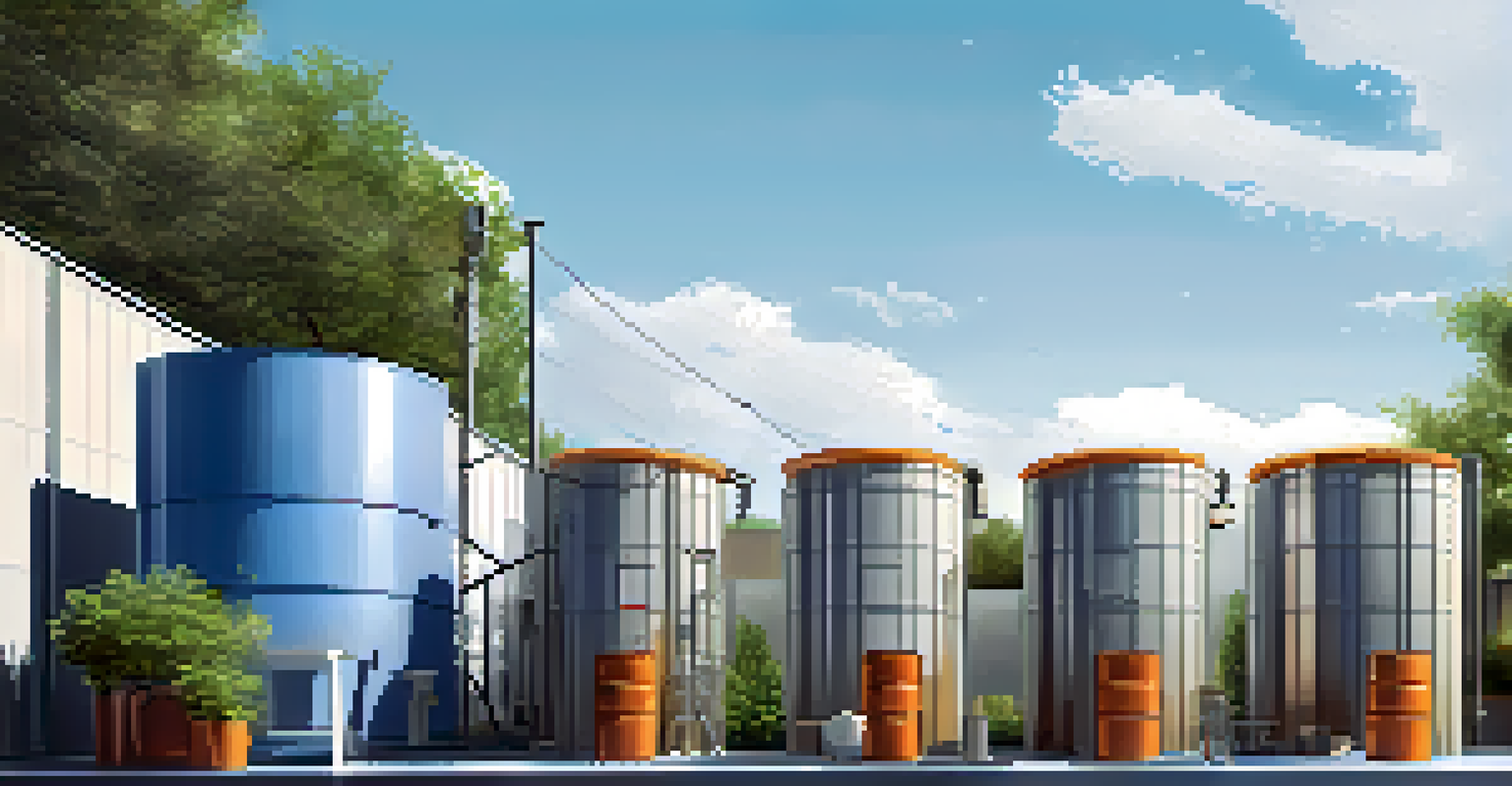Water Conservation Strategies for Businesses

Understanding the Importance of Water Conservation
Water is a vital resource for businesses, yet many underestimate its importance. It's not just about keeping the taps running; conserving water can lead to significant cost savings and improved sustainability. As global water scarcity increases, businesses that prioritize water conservation will not only protect the environment but also enhance their reputation.
We never know the worth of water till the well is dry.
Moreover, consumers today are more conscious of the environmental impact of their purchases. By demonstrating a commitment to water conservation, businesses can attract eco-minded customers who prefer brands that are socially responsible. This can translate into a loyal customer base and potentially higher sales.
In summary, understanding the significance of water conservation is the first step for any business looking to thrive in today's eco-conscious market. Embracing water-saving practices can lead to both financial gains and a positive community impact.
Conducting a Water Audit for Your Business
A water audit is an essential first step in identifying where and how your business uses water. By analyzing usage patterns, businesses can pinpoint areas where water is being wasted or where efficiency can be improved. This comprehensive assessment provides a clear picture of water consumption and helps set realistic conservation goals.

During a water audit, consider examining the plumbing systems, irrigation practices, and employee habits. Engaging staff in this audit can also foster a culture of sustainability within the organization. Once potential issues are identified, businesses can prioritize which strategies will have the most significant impact.
Water Conservation Boosts Business
Prioritizing water conservation not only protects the environment but also enhances a business's reputation and financial performance.
Ultimately, a thorough water audit lays the groundwork for effective conservation strategies. It empowers businesses to make informed decisions that lead to genuine water savings and showcases a commitment to responsible resource management.
Implementing Low-Flow Fixtures and Appliances
One of the simplest yet effective strategies for water conservation is upgrading to low-flow fixtures and appliances. These innovations, such as low-flow faucets, showerheads, and toilets, can significantly reduce water usage without compromising performance. For instance, low-flow toilets can save up to 20% more water per flush compared to standard models.
The greatest threat to our planet is the belief that someone else will save it.
In addition to reducing water consumption, these fixtures often lead to lower utility bills, providing an immediate financial incentive. Many businesses have reported substantial savings after making the switch, which can be reinvested into other sustainability initiatives.
Embracing low-flow technology is a win-win situation. Not only does it contribute to water conservation, but it also enhances operational efficiency and supports a greener business image.
Rainwater Harvesting: A Sustainable Solution
Rainwater harvesting is an innovative and sustainable approach to water conservation that many businesses are beginning to adopt. By collecting rainwater from rooftops and other surfaces, businesses can reduce their reliance on municipal water supplies. This harvested water can be used for irrigation, toilet flushing, and other non-potable uses, significantly lowering overall water consumption.
Implementing a rainwater harvesting system may require an initial investment, but the long-term savings and environmental benefits can be substantial. Additionally, many regions offer incentives or rebates for businesses that invest in such systems, making this solution even more appealing.
Conduct Water Audits Regularly
Conducting regular water audits helps identify wasteful practices and sets the stage for effective conservation strategies.
Ultimately, rainwater harvesting not only conserves water but also promotes a more sustainable business model. It allows businesses to take advantage of a natural resource that would otherwise go to waste.
Employee Engagement in Water Conservation Practices
Engaging employees in water conservation efforts is crucial for fostering a culture of sustainability within your business. Educating staff about the importance of water conservation and how they can contribute can lead to a collective effort in reducing usage. Simple actions, like turning off the tap while washing hands or reporting leaks, can make a significant difference.
Creating an internal campaign or incentive program can further motivate employees to participate in water-saving initiatives. Recognizing and rewarding those who actively engage in conservation efforts can boost morale and encourage others to follow suit.
By involving employees in water conservation practices, businesses not only save water but also build a sense of community and shared responsibility. This collaborative approach can lead to innovative ideas and solutions that enhance overall water efficiency.
Landscape Management for Efficient Water Use
Effective landscape management is another vital strategy for conserving water in a business setting. By choosing drought-resistant plants and implementing smart irrigation systems, businesses can significantly reduce outdoor water consumption. For instance, xeriscaping, which involves landscaping with native and drought-tolerant plants, can cut water usage by as much as 50%.
Additionally, utilizing drip irrigation systems allows for targeted watering of plants, minimizing runoff and evaporation. Regular maintenance and monitoring of irrigation systems can ensure they operate at peak efficiency, further conserving water.
Engage Employees for Sustainability
Involving employees in water conservation efforts fosters a culture of sustainability and encourages innovative solutions within the organization.
Incorporating efficient landscape management not only saves water but also enhances the aesthetic appeal of the business premises. A well-maintained landscape can attract customers and create a welcoming environment while promoting sustainability.
Leveraging Technology for Water Monitoring
Technology plays a crucial role in modern water conservation strategies. By utilizing smart water meters and monitoring systems, businesses can track their water usage in real-time, identify leaks, and pinpoint areas of inefficiency. This data-driven approach allows for timely interventions and ensures that water is used responsibly.
For instance, automated systems can alert managers when usage exceeds normal levels, prompting immediate action to address potential leaks or waste. Additionally, data analytics can reveal patterns in water consumption, helping businesses make informed decisions about conservation measures.

By leveraging technology for water monitoring, businesses can stay ahead of potential issues and optimize their water usage. This proactive approach not only conserves water but also enhances operational efficiency and reduces costs.
Evaluating and Adjusting Your Water Conservation Plan
Creating a water conservation plan is just the beginning; evaluating and adjusting it regularly is crucial for long-term success. Periodic assessments can help businesses identify what strategies are working and what areas need improvement. This ongoing evaluation allows for flexibility and adaptation, ensuring that conservation efforts remain effective.
Gathering feedback from employees and stakeholders can provide valuable insights into the effectiveness of current strategies. Engaging staff in discussions about water conservation can lead to new ideas and a deeper commitment to sustainability.
In conclusion, regularly evaluating and adjusting your water conservation plan ensures that your business remains on track to meet its goals. It fosters a culture of continuous improvement and innovation, ultimately leading to better water management and sustainability.